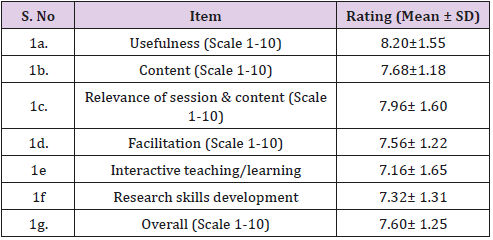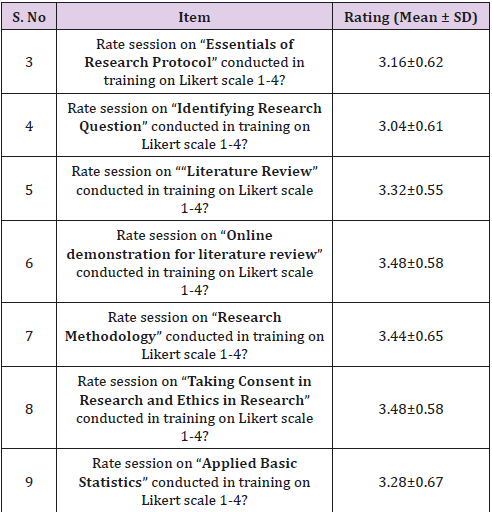Abstract
Background
Postgraduate residents have to prepare synopsis for conducting research to develop thesis as pre-requisite to appear Tribhuvan University qualifying examination for MD/ MS/MDS/MN. Undertaking research is one of the competencies resident has to acquire during training. For serving the purpose Universal College of Medical Sciences (UCMS), Bhairahawa organized one-day research methodology training for first-year residents on June 11, 2019. The objective of this study was to take feedback of participant residents and assess their reaction/perception at Kirkpatrick level one.
Methods
Feedback of the participant was taken on valid semi-structured questionnaire comprised of four parts: demographic information, overall feedback on training, feedback on specific sessions and feedback for improvement. Data analysis was done using SPSS version 21.
Results
The participants rated training on scale 1-10 (1=poor, 10=excellent) regarding usefulness (8.20±1.55), content (7.68±1.18), relevance (7.96±1.60), facilitation (7.56±1.22), interactive teaching/learning (7.16±1.65), research skills development (7.32±1.31) and overall (7.60±1.25). Participants’ reaction/perception on specific sessions conducted in training rated on Likert scale 1-4 (4=Strongly agree, 1=Not agree) was notable; “Essential of Research Protocol” (3.16±0.62), “Identifying Research Question” (3.04±0.61), “Literature Review” (3.32±0.55), “Online Demonstration for Literature Review” (3.48±0.58), “Medical Research Methodology” (3.44±0.65), “Taking consent in research and ethics in research” (3.48±0.58), and “Applied Basic Statistics” (3.28±0.67). Two participants mentioned that “Learnt so many aspects of research I had no idea about them before”. They suggested to increase duration of workshop for better learning about subject and doing practice for writing synopsis for thesis.
Conclusion
The reaction/perception of participants was positive and constructive. Their suggestion to increase duration of training was valid.
Keywords: Feedback; Perception; Reaction; Residents; Research; Training
Introduction
A research methodology training is a crucial to develop capacity of future healthcare professionals with art of research skills [1]. Residents are prospective healthcare professionals, so, developing capacity of postgraduate residents in undertaking research is vital. Conducting research is among the core competencies of residency program. It enriches analytic and critical thinking skills of resident, promote lifelong learning and foster evidence-based medicine practice and quality patient care [2]. The thesis submission to Tribhuvan University Institute of Medicine (TU-IOM) Kathmandu Nepal is mandatory as a partial fulfillment to each postgraduate (PG) resident of all subjects who perusing Doctor of Medicine (MD), Master of Surgery (MS), Master of Dental Surgery (MDS) and Master of Nursing (MN) courses before appearing in final qualifying examination. Hence, each PG has to conduct research for thesis. They have to submit research synopsis (proposal) during first year of residency [3,4]. UCMS is affiliated with TU-IOM running postgraduate courses in medicine, dentistry, nursing and allied sciences [5]. A one-day workshop in research methodology was conducted for new batch of first year MD/MS/MDS/MN residents at Universal College Medical College of Sciences (UCMS) Bhairahawa Nepal. The feedback from the participant residents is critical to make necessary changes in content, methodology, duration and process of workshops to be conducted in future for incoming batches of PG residents [6]. The objective of this study was to take feedback of the participant residents and assess reaction/ perception of the participants at Kirkpatrick level one.
Methodology
A one-day “Research Methodology Training for First Year
Postgraduate Residents” was conducted on June 11, 2019 at
Universal College of Medical Sciences (UCMS) Bhairahawa, Nepal.
It was of 8 working hours and 3.75 credit points was awarded by
Nepal Medical Council for this training. Twenty-eight residents
participated in training; sixteen from clinical sciences, five from
basic sciences, five from dentistry and two from nursing. Six
resource persons from UCMS conducted sessions in training. The
sessions conducted were:
1. Essential of Research Protocol,
2. Identifying Research Question including making
hypothesis and process in thesis writing,
3. Literature Review including citation and referencing,
4. Online Demonstration for Literature Review including
approaching the site for search,
5. Medical Research Methodology including designing
methods for specific studies,
6. Taking consent in research and ethics in research, and
7. Applied Basic Statistics including sample technique and
sample size calculation. Tutorial, brainstorming and demonstration were the methods
utilized for training.
The objective of this study was to take feedback from the participant residents and assess how they react/perceive the training at level-I of Kirkpatrick model of evaluation. Kirkpatrick model of evaluation has four levels: Level I: Reaction, Level 2A: Learning-change in attitude, Level 2B: Learning-modification of knowledge and skills, Level 3: Behavior-change in behavior, Level 4A: Results: change in the system or organizational practice and Level 4B: Results-change among the participants’ students and peers [7]. At the end of training workshop, feedback of the participant residents was taken on the valid semi-structured questionnaire comprised of four parts.
Part A. Demographic Information
Info was taken on age in years, sex, year of graduation and any training related to research received before.
Part B. Overall Feedback on Training
This part contained two close ended questions; one was on rating training on scale 1-10 (1=poor, 10=excellent) for usefulness, content, relevance of session and content, facilitation, interactive teaching/learning, research skills development and training as overall; while another was whether this training has transformed you a good researcher on Likert Scale 1-4 (4=Strongly agree, 3=Fairly agree, 2=Slightly agree, 1=Not agree).
Part C. Feedback on Specific Sessions
This part covered seven closed ended questions on rating specific sessions conducted in training. The questions were on: “Essential of Research Protocol”, “Identifying Research Question”, “Literature Review”, “Online Demonstration for Literature Review”, “Medical Research Methodology”, “Taking consent in research and ethics in research”, and “Applied Basic Statistics” and rated on Likert scale 1-4 (4=extremely Important, 3=moderately important, 2=slightly important, 1=not important).
Part D. Feedback for Improvement
This part had three open ended questions; one was on good points/strengths of training, second on areas for improvement and third for additional comments.
The informed consent was taken from the participants and ethical approval was obtained from institutional review committee of UCMS. The data collected was checked for completeness, accuracy and consistency. It was entered in IBMS SPSS version 21 for analysis. Descriptive analysis was done; the frequency, mean and standard deviation were computed.
Results
Part A. Demographic Information
Out of 28 participants, 25 consented to provide feedback; the response rate was 89.28%. The age of the participant residents was 28.242.96 years (range 22-37 years); 12 were males and 13 females. Nineteen were from medicine (MBBS), 4 from dentistry (BDS) and 2 from nursing (BSc/BN). Only two participants (7%) received training before.
Part B. Overall Feedback on Training Workshop
The participant residents rated “Research Methodology Training” on scale of 1-10 (1=poor, 10=excellent); the rating was notable (Table 1). The participant residents rating on the statement “training has transformed you a good researcher” on Likert Scale 1-4 (4=Strongly agree, 3= Fairly agree, 2= Slightly agree, 1= Not agree) was remarkable 3.36± 1.63
Part C. Feedback on Specific Sessions
The rating of the participant residents on specific sessions conducted in ““Research Methodology Training” was noteworthy (Table 2).
Table 2: Rating of the participant residents on specific sessions conducted in ““Research Methodology Training”.
Part D. Feedback for Improvement
The strengths/good points of workshop shared by the participants were: training covered all topics related to research methodology, preparation of questionnaire, protocol development, aspects related to thesis, good examples, understandable language, interactive sessions, two-way communication, online demonstration how to access to journal, certificate with credit hours. Two participants mentioned that “Learnt so many aspects of research I had no idea about them before”. The suggestions were: to increase duration of workshop for better learning about subject and doing practice especially for understanding bioethics and writing synopsis for thesis, cover session in time, provide short breaks in between sessions, conduct more such type of trainings, and make training more interactive. The Additional comments were training lent satisfaction, resource persons were really resourceful.
Discussion
The present study was conducted to take feedback of the participant residents and assess reaction/perception of the participants at Kirkpatrick level one. The participants rating was remarkable on scale 1-10 (1=poor, 10=excellent) regarding usefulness of training, content of training, relevance of sessions & content, facilitation by resource persons, interactive teaching/ learning, research skills development and overall. Participants perceived that training have transformed them good researcher. Participants immediate reaction on specific sessions “Essential of Research Protocol”, “Identifying Research Question”, “Literature Review”, “Online Demonstration for Literature Review”, “Medical Research Methodology”, “Taking consent in research and ethics in research”, and “Applied Basic Statistics” rated on Likert scale 1-4 (4=Strongly agree, 1=Not agree) was very positive. The findings of this study are consistent with findings of studies conducted by Bidwe S et al. Domple VK et al. and Alfakih AH [6,8,9]. The participant residents mentioned training covered all topics related to research methodology.
Two participants mentioned that “Learnt so many aspects of research I had no idea about them before”. This finding consists with the findings of studies done by Bidwe S et al. & PR Shankar et al. [8,10]. The participants suggested to increase duration of workshop for better learning about subject and doing practice especially for understanding bioethics and writing synopsis for thesis. This is a constructive feedback, hence, there is need for improvement in training. Even after three days research methodology workshop for postgraduate students, Domple VK et al. [6] mentioned about scope of improvement in sessions like literature search, hands on literature search in their study titled “Feedback of postgraduate students about research methodology workshop” [6]. The limitations of this study are that it was conducted at one institution involving a limited number of trainees and only assessed reaction/ perception of the participants immediate after the training but not its long-term impact of training. Thus, more research is required on the long-term effectiveness of research training.
References
- Al Tannir M, Abu Shaheen A, Alsumaih S, AlMukaibil NF, AlHarbi R, et al. (2018) Research Knowledge and Skills Among Medical and Allied Health Students Attending a Summer Research Course: A Pretest and Posttest Analysis. Cureus 10(8): 3132.
- Satav PJ, Wankhede UN (2017) Knowledge, attitude, and practice of resident doctors about medical research in BJ Medical College, Pune, Maharashtra. Int J Reprod Contracept Obstet Gynecol 6(7): 2969-2972.
- http://www.iom.edu.np/?page_id=137
- Sharma VK (2008) Glimpses of Postgraduate Teaching Programs of Nepal. Post Graduate Medical Journal of National Academy of medical Sciences 8(1).
- ucms.com.np
- Domple VK, Hiwarkar PA, Shrigiriwar MB (2019) Feedback of postgraduate students about research methodology workshop. Int J Community Med Public Health 6(1): 100-104.
- Al Tannir M, Abu Shaheen A, Alsumaih S, AlMukaibil NF, AlHarbi R, et al. (2018) Research Knowledge and Skills Among Medical and Allied Health Students Attending a Summer Research Course: A Pretest and Posttest Analysis. Cureus 10(8): 3132.
- Bidwe S, Nemade ST, Kamble CG, Powar GD (2017) Role of Research methodology workshop in improving research skills by pretest- posttest analysis. Indian Journal of Basic and Applied Medical Research 6(4): 74-77.
- Alfakih AH (2017) A training program to enhance postgraduate students' research skills in preparing a research proposal in the field of curriculum and instruction methods of Arabic language. IOSR J Res Method Educ 7(3): 1-6.
- Shankar P, Subish P, Alam K (2012) A research methodology workshop on ‘Social issues in use of medicines’- cooperation between institutions and participant feedback. Journal of College of Medical Sciences-Nepal 8(1): 60-67.

 Research Article
Research Article

